- Home
- Simon Kernick
Die Alone Page 20
Die Alone Read online
Page 20
The problem was that the two people who did have an idea of what was going on weren’t helping him. It was too risky to talk to Tina off the record. And Mason had disappeared into thin air. Except, as Bolt knew from years as a detective, no one disappears into thin air. Tina had been helping Mason, he was convinced of that, but there had to be other people involved for him to evade detection.
So Bolt was going back in time, looking for likely helpers. According to the prison records, Mason had only had one visitor in his whole time behind bars, and that was his lawyer, Edward Kleinman, who at sixty-three, with an unblemished record, was unlikely to be caught up in anything illegal.
Mason’s phone records for the six months up to and including the day of his arrest were spread out on the desk in front of him. He started from the most recent statement, crossing out the calls he wasn’t interested in with a red pen. There were at least two a day to Tina, sometimes more, and Bolt felt a twinge of jealousy that irritated him as he crossed those out too. In the weeks leading up to his arrest, Mason had been one of the main investigators on the Bone Field case and there were plenty of calls between him and his fellow investigator, DS Dan Watts, who’d died in mysterious circumstances on the night of Mason’s arrest. There were also ones to and from Sheryl Trinder, who’d been Mason’s boss at the time, but Bolt wasn’t interested in any of these. He was interested in people they didn’t know about and, after he’d gone through all the statements with the red pen, there weren’t that many numbers left.
One number did catch his eye. It turned up eight times in the three months running up to Mason’s arrest, including four times in the space of a week. It was a landline belonging to a Steve and Karen Brennan.
Bolt rubbed his eyes and took a sip from the glass of Pinot Noir he had on the desk next to him. The names sounded familiar.
Then he remembered. They were the parents of Dana Brennan, the thirteen-year-old girl who’d gone missing in Hampshire decades before, and whose remains had been found in school grounds in Buckinghamshire the previous year, alongside those of a young woman in her twenties called Katherine Sinn, who herself had gone missing the year after Dana. Bolt recalled now that Mason had been investigating those cases too, not for the NCA, but for one of the Met’s Murder Investigation Teams. The murders of Dana Brennan and Katherine Sinn had never been officially linked to the Bone Field murders, although Bolt remembered that Sinn had been Alastair Sheridan’s cousin.
The series of four calls had been made between Mason and the Brennans in the week after the discovery of Dana’s body, which stood to reason as he’d been investigating their daughter’s murder. Bolt’s team had produced a detailed dossier on Mason, which Bolt had read and re-read a dozen times since his escape. It was how he knew immediately that Mason had been suspended from the investigating team before he’d made the fourth call to the Brennans. It was possible, of course, that Mason had just been telling them that he’d been removed from the case. But he’d still been under suspension when he’d made the fifth call two weeks later. According to the records, they’d talked for eleven minutes. And there were two more – one by Mason, one by the Brennans – over the next six weeks, each one lasting close to fifteen minutes, before Mason made a final one, a few minutes before his arrest, lasting eight minutes.
The thing was, there was no reason for Mason to be talking to the Brennans in any of those last four calls. He wasn’t on the case, and the couple would already have been assigned a specialist liaison officer to keep them informed of any progress on the reopened inquiry into the murder of their daughter. But Mason had still been talking to them. Why? There was only one reason Bolt could think of: he’d become emotionally involved in the case. It would also explain his actions since being broken out of prison. Rather than make a run for it like any ordinary escaped prisoner, he’d gunned down Cem Kalaman, a man Tina Boyd had claimed was one of the Bone Field killers.
But who’d broken him out of prison in the first place? Steve Brennan was in his mid-sixties. It wouldn’t have been him. But at the very least he was worth looking at further. It wouldn’t take Bolt long to get hold of the Brennans’ phone records. He thought about doing it now, but it was already close to ten p.m.
He yawned, finished off the Rioja, and looked over at Leanne.
It could wait until tomorrow.
39
Alastair Sheridan missed the hunt.
The hunt had been their thing, the three of them – he, Cem, and their mentor, the man they’d called Mr Bone. After their first two murders they’d worked out a system. Victims were selected from those unlikely to be missed. These included prostitutes, runaways and, more recently, illegal immigrants, usually brought into the country by Cem’s own criminal organization. Only very trusted operatives were involved in procuring the victims and transporting them down to the farm in Wales they’d bought for the specific purpose of the hunt, and even those operatives had no idea what was going to become of the girls.
Over the years, nineteen young women, aged from mid-teens to late twenties, had died at the farm. The police had only found the remains of seven because Cem and Mr Bone had used acid, and more recently pigs, to get rid of the corpses. It had worked well. Sometimes the victims were hunted through the surrounding forest for sport, but more often they were imprisoned in a specially built basement, tortured and raped, usually over the course of a weekend (although one particular beauty had been kept alive for weeks), before finally being put to death. Their ends were always filmed and, although Alastair had learned never to hang onto mementoes of what he’d done, he did enjoy watching the films afterwards when the three of them were together. Reliving those moments gave him a sense of power that he found hard to put into words.
It was highly unlikely they’d ever have been caught if it hadn’t been for Ray Mason. Surprisingly enough, though, Alastair didn’t hold any ill feelings towards him. He wasn’t the kind to brood. Nor was his sadism all-consuming. He was a planner, a man who always had to be in control of a situation. Only when he felt perfectly safe did he let the savagery that resided deep within him out of its box and give it free rein. Then it would be put back in again until the next time. And that was why Alastair had survived and prospered. Because, unlike Mr Bone or even Cem, he was able to live very easily among people who were not like him. He was charming; he could pretend to be kind without anyone noticing his innate fakery. He made people want to like him. That was his genius.
And that, of course, was why he’d be Prime Minister.
It was late when his driver pulled inside the gates of the family home and came to a halt on the large turning circle in front of the main house. Both the driver and the man next to him were armed police officers. Alastair had requested them: he might have been the man who’d organized Ray Mason’s escape from prison but he’d also been prudent enough to know that it might be better to have another layer of protection in place in case, as had happened, Mason disappeared. Obviously, with no known connection between him and Mason, Alastair could hardly have cited him as a reason for needing the bodyguards, so instead he’d sent some threatening letters to himself, and bingo, the bodyguards had materialized. It always amazed him how easy it was to fool people.
The two officers – young, professional, and not easily fazed – got out of the car along with Alastair and walked on either side of him to the front door. They kept their hands close to their guns and a vigilant eye out for any danger. But with each passing hour the threat from Mason receded, and Alastair was feeling safe enough to admire the beauty of the beautifully restored ten-bedroom Georgian mansion he called home, lit up tonight in ethereal green by a dozen strategically placed spotlights. Alastair had bought it outright seven years ago for a little over £6 million, and he’d just had it valued at £8.2 million. His father would have been proud of him.
The Asian officer, Asif (it was always first names with Alastair), placed a phone call to a third officer inside the house, whose job it was to look after Katherine a
nd his son, and she answered the door to them.
‘They’ve both gone to bed, sir,’ she said as Alastair stepped inside followed by the other two, giving him a smile.
She was young, late twenties, handsome rather than pretty, and big-boned, but attractive nonetheless. He gave her a dazzling smile in return, imagining her naked and chained to a bed while he whipped and beat her mercilessly. ‘Thanks, Susie. I think I’ll join them. I’ll see you guys in the morning. Thanks so much for doing this. I really appreciate it.’
He mounted the stairs to the master bedroom, satisfied with how the day had gone. It would have been nicer to know that Mason was riddled with bullets somewhere but he was far less of a threat now that Alastair had police protection. It was time to move into holiday mode, but sleep was far from his mind, and the thought of a naked and bleeding Susie had aroused him.
As he slipped inside the bedroom, quietly closing the door behind him, he saw that Katherine was indeed asleep. He stopped by the bed and looked down at her. She was still a good-looking woman, and she kept herself in excellent shape thanks to her personal trainer and yoga sessions, but she’d never really done that much for him, mainly because – like a fragile, priceless artefact – he’d never been able to treat her roughly. She was there to project his family-man image, and deflect any suspicion of sexual wrongdoing, and as such he’d never even raised a hand to her – a feat that had taken huge amounts of self-discipline. Whenever they had sex, Alastair had to fantasize that she was a prospective victim and that he was pretending to be tender to lull her into a false sense of security.
He leaned over and touched her hair, wanting to pull it hard, and she stirred.
‘Is that you, Alastair?’ she whispered without moving or opening her eyes.
He ran a hand over her naked shoulder, stroking it. ‘It is. Sorry I’m late.’
‘Come to bed, we’ve got to be up early,’ she grunted testily.
God, he wanted to hurt her then. To leap on top of her and beat her into submission so she was choking on her own blood and begging for mercy.
One day, he thought. One day I’ll do you too.
He turned away to avoid temptation and masturbated quickly in the en suite bathroom to rid himself of the mood, knowing that it would just get worse if left unchecked. Then he cleaned his teeth, got undressed, and slipped into bed, where he fell quickly into the warm, dreamless sleep of those who have no conscience.
40
Going on the run can be done. I’d proved that. I’d been free for over two weeks now, with the police, the NCA and most of the British underworld after me. But in a digital age, where your every transaction, your every footstep even, is recorded somewhere, and if there are enough resources against you, the whole thing becomes an increasingly precarious balancing act. One wrong move and it’s all over.
So far, though, I was still ahead of the game. Steve Brennan and I had caught the Portsmouth ferry to St Malo with me hidden in the boot of the Audi estate under a blanket with empty suitcases piled on top, and screened from the outside world by a couple of boxes filled with the kind of bits and pieces you take with you when you’re travelling to your house in France. Security is a lot looser going out of the UK on ferries than coming in, because the illegal immigrant stowaways customs officers are looking for are usually coming the other way. It had been an uncomfortable journey down in the hold where the movements of the sea are far more pronounced, but a small price to pay to escape the UK.
At the other end Brennan’s car had been stopped at passport control, but after a brief conversation with the passport officer he’d been let through and, a few minutes later, when we were safely clear of the terminal, I’d joined him in the front. It had been that easy.
However, the next step was always going to be the hard part. I was going to need transport so, after some discussion, we’d stopped at a car rental place in the town of Fougères and, while I waited in the Audi, Brennan had rented a Renault Megane for two weeks in his own name. As soon as he was done, I’d followed him in the Megane to the holiday home they’d bought some years before, after their surviving daughter had left home.
And now, on Sunday night, here we were, Steve Brennan and me, sitting in armchairs in the cottage’s olde worlde living room, having consumed a huge chicken and vegetable stew, washed down with a bottle each of Fleurie. We’d talked all evening and the thing was, it hadn’t been maudlin. Brennan had spoken happily about the first half of his life: a childhood growing up by the sea in Dorset, meeting Karen, having two wonderful daughters, the family holidays. The fun, the laughter. Memories someone like Alastair Sheridan could never erase. And I’d told Brennan about my life, about my experiences in the police and military, as well as the failures. The pain of losing friends, the pain of prison, but the good things too. The camaraderie I’d had in the army; the one happy relationship before Tina which I still remembered with fondness years later. And the fact that I’d brought people to justice whose crimes would otherwise have gone undetected.
‘And you said there’s one more man responsible for Dana’s murder,’ said Brennan, his words slightly slurred from the wine. ‘Someone who’s going to get away with it.’ He looked incredulous. ‘And the police still aren’t interested in charging him?’
I sighed, wondering whether it had been such a good idea emphasizing the fact that there was still someone out there. But I opted for the truth. ‘The problem is, Dana died nearly thirty years ago, and the evidence against this third man is sketchy and circumstantial, which means no police officer would even think about charging him, and the CPS would throw it out way before it ever came to court. But I know for an absolute fact it’s him.’
‘And you can’t tell me who it is?’
‘I don’t want to. It won’t help. But let me tell you this. If an opportunity shows itself, I will get him. I promise.’
Brennan looked at me sadly. ‘I don’t want you to do any more on our account, Ray. Let it go. You’ve got a chance to build a new life now. Do it.’
I took a generous sip of the Fleurie, savouring the taste. It was the first time I’d relaxed in more than a year. I could see the light at the end of the tunnel. The possibility of change. Of reinventing myself. Of finally finding a measure of peace after a lifetime of violent upheavals.
But I could also see Alastair Sheridan’s smug, laughing face. A man who revelled in killing. Who knew he’d got away with it time and time again. A man who could be Prime Minister.
And I knew that if I let him live, Alastair Sheridan would haunt my dreams for ever.
Part Five
* * *
41
To gain full access to someone’s telephone and financial records, the NCA simply have to have that individual declared a person of interest by a senior officer. So at eight a.m. the next morning, Mike Bolt told DCS Sheryl Trinder about what he’d found the previous night in Ray Mason’s old phone records. She wasn’t hugely enthusiastic that it would lead anywhere but, given the lack of progress in every other area of the inquiry, she was willing to give it a shot, and gave him the authorization he needed.
Things can move fast in a police inquiry if the will is there to drive them forward, and the will to apprehend Mason either dead or alive was most definitely there, so it took less than an hour for copies of the Brennans’ bank, credit card and phone statements to be on Bolt’s desk. Rather than waste the time of any of his team, he closed his office door and scanned them himself with his second large Americano of the day.
A few small things stood out, most particularly a phone call from an unidentified mobile number to the Brennans’ home landline a couple of days earlier that had lasted nine minutes. It stood out not only because it was one of only seven calls made to the number in the previous two weeks (the others all appeared to be sales calls), but because of the timing. The call had been made two days ago at 11.39 a.m. – the morning after the Kalaman killings, the same day that Tina almost certainly collected fake documents for Ma
son, and was then subsequently arrested after the murder of her neighbour and the police chase. A search of Brennan’s mobile phone records also showed that he’d received a call from the same number at 20.02 that same Saturday night, and another eleven minutes later.
There was also a payment on Steve Brennan’s Visa debit card to P&O Ferries, made three hours after the phone call to his landline, followed by a second payment, made yesterday, to a branch of Hertz in Fougères, France. The payment was for more than €800, suggesting that he’d rented a car for a reasonably substantial length of time. Bolt had no idea where Fougères was but when he checked on Google Maps, he saw that it was some fifty miles east of the ferry port of St Malo.
Now all of these things could have simply been coincidence, but if the Brennans had travelled to France by ferry, it did seem strange that they’d hire a car that far from the port. Either way, as far as Bolt was concerned, it merited further investigation.
He called Mo in and suggested he use a couple of the analysts on the team to help him get a better picture of Steve Brennan’s movements over the past forty-eight hours.
While that was going on, Bolt got an update from the SIO on the Mary West murder. There was no real progress, although one witness reported seeing a woman walking briskly up the hill behind Mrs West’s house around the time of the shooting. Unfortunately the witness could give no further details of what the woman looked like as she’d been too far away. Next he called the SIO on the Kalaman killings. Her team hadn’t turned up any further clues either during the extensive search of the crime scene and were still trying to work out how Mason had got onto the rooftop.
‘He either broke into an apartment or rented one,’ Bolt told her.
‘I know that,’ she answered testily, ‘but it’s hard to get inside any of the apartment buildings. That whole block’s like a ghost town. No one lives there. Most of the owners aren’t even on the same continent.’

 Die Alone
Die Alone Deadline
Deadline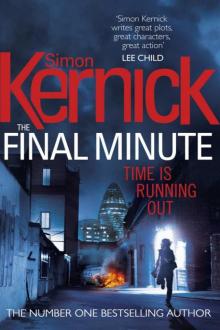 The Final Minute
The Final Minute We Can See You
We Can See You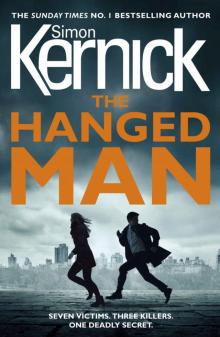 The Hanged Man (Bone Field 2)
The Hanged Man (Bone Field 2)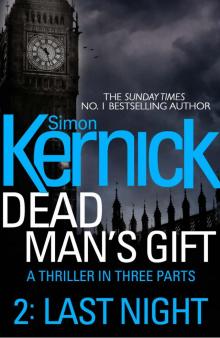 Dead Man's Gift 02 - Last Night
Dead Man's Gift 02 - Last Night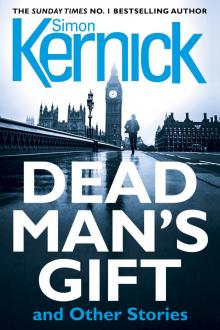 Dead Man's Gift and Other Stories
Dead Man's Gift and Other Stories A Good Day To Die
A Good Day To Die The Last 10 Seconds
The Last 10 Seconds The Murder Exchange
The Murder Exchange The Bone Field
The Bone Field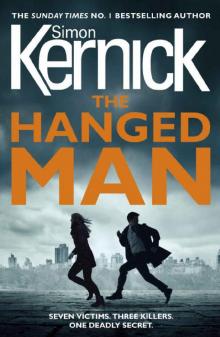 The Hanged Man
The Hanged Man Target
Target The Last 10 Seconds: A Novel
The Last 10 Seconds: A Novel Relentless: A Novel
Relentless: A Novel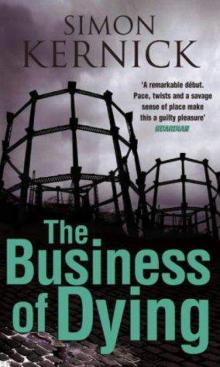 The Business Of Dying
The Business Of Dying Die Twice
Die Twice Flytrap
Flytrap Stay Alive
Stay Alive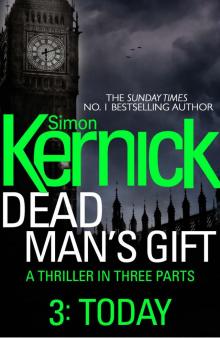 Dead Man's Gift 03 - Today
Dead Man's Gift 03 - Today The Payback
The Payback Siege: A Thriller
Siege: A Thriller The Crime Trade
The Crime Trade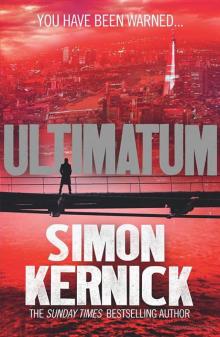 Ultimatum
Ultimatum